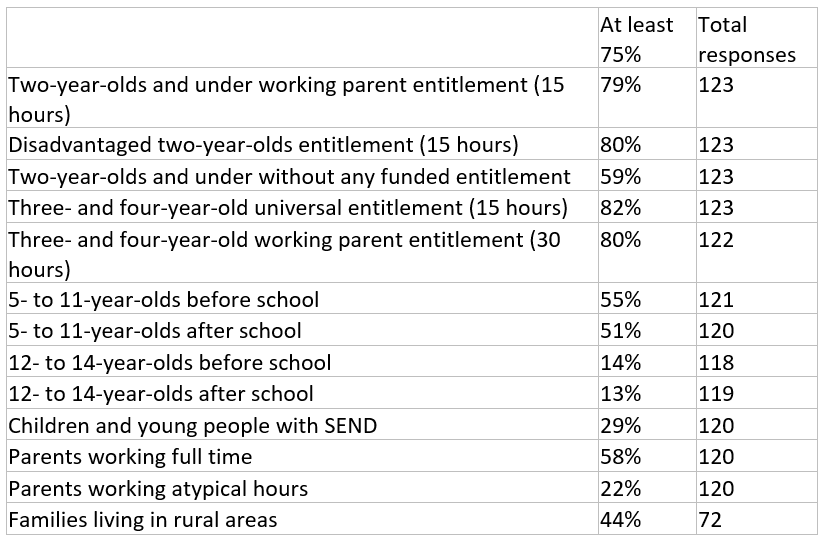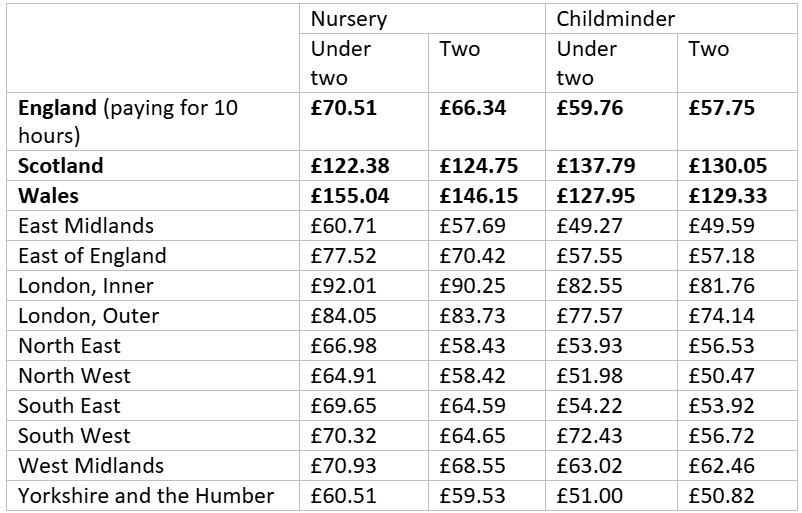You are here: News Childcare entitlement expansion sees childcare costs for under-threes in England more than halve, whilst prices in Scotland and Wales continue to rise
- Coram Family and Childcare’s 24th annual survey is the first published since the roll-out of new childcare entitlements for working parents in England began in April 2024
- With the new funded hours for eligible working parents, a part-time nursery place for a child under two now costs an average of £70.51 per week in England, down by 56% on 2024
- However, Scotland and Wales see price rises of 7% and 10% respectively, and childcare costs for three-to-four-year-olds across Great Britain are up by almost 5%
- Report also finds continued gaps in availability of childcare places for children with special educational needs and disabilities
Working parents of children under three in England now pay less than half of last year’s cost for a part-time nursery place according to the first annual childcare survey to be published since the government roll-out of childcare support began in April 2024. Coram Family and Childcare’s 24th annual Childcare Survey finds that a part-time nursery place for a child under two in England now costs an average of £70.51 per week, down by 56% on 2024, and a full-time nursery place for a child under two costs an average of £238.95 per week, down by 22% on 2024.
However, as these new entitlements are only in England, Scotland and Wales have not seen the same reduction in costs, with a part-time nursery place for a child under two now costing an average of £122.38 per week in Scotland, an increase of 7% on 2024, and an average of £155.04 per week in Wales, a 10% increase on 2024. Entitlements for three-to-four-year-olds across Great Britain also remain unchanged across all nations, and childcare costs for these children have increased by almost 5% on 2024.
The report also finds that families who are not eligible for the new entitlements for children under three in England – because they are not in work, do not earn enough or do not meet other criteria – pay £105 per week more than eligible families for a part-time nursery place for a child under two, meaning there is a risk that disadvantaged children are being priced out of accessing the same early education as those in working families.
Today’s survey also looks at childcare availability** and indicates a positive picture of the expansion roll-out so far, with the highest levels of sufficiency reported for all the funded entitlements. 79% of local authorities in England who responded to the survey say they have enough childcare for at least 75% of children eligible for the new funded entitlement. In addition, 80% of English local authorities who responded to the survey report having enough childcare for at least 75% of children in their area who are eligible for the disadvantaged two-year-old entitlement.
However, echoing trends from previous years of the Childcare Survey, the report finds gaps in availability for children with special educational needs and disabilities (SEND). Only 29% of local authorities in England who responded to the survey report having enough childcare for at least 75% of children with SEND in their area, whilst just 22% report having enough childcare for at least 75% of children in their area whose parents work atypical hours.
Lydia Hodges, Head of Coram Family and Childcare, said:
This year’s Childcare Survey shows just how different the picture can be for families with funded support from the government, and the new entitlements are a very welcome step towards making childcare affordable for working parents and easing the difficult choices around work and care that parents have faced for many years.
However, the system needs to be rebalanced to ensure that all children have the best start in life during their essential early years. Parents who are not eligible for the entitlements are unlikely to be able to meet the cost involved in giving their children the same amount of early education that other children get for free, and many children with special educational needs and disabilities are still finding it hard to get a place.
As part of this year’s survey, for the first time we spoke to parents on their views and experiences of childcare, and many highlighted the positive impact that it has had on their child’s independence, development and happiness. These are things we want for all children, and we call on the Government to commit to immediate and longer-term actions so that no child misses out on this vital boost to their outcomes.
Notes to Editors
For comment and case studies, please contact Emma Lamberton, Senior Communications Manager, Coram: emma.lamberton@coram.org.uk / 07908 827908
*2024 saw the first two phases of the entitlements for working parents in England rolled out – a commitment introduced by the previous government and continued by the new government. From April 2024, eligible working parents of two-year-olds can access 15 hours of funded childcare per week and from September 2024, eligible working parents of children from nine months old can access 15 hours of funded childcare per week. The final phase of the roll-out is in September 2025, when eligible working parents of children from nine months old up to school age can access 30 hours of funded childcare per week
**Childcare availability questions were changed in the survey this year to be more specific about the level of childcare sufficiency, and to ask about the ‘children’ in the local authority rather than the ‘area’. The change in question therefore precludes direct year-on-year comparisons but the trends of low sufficiency remain the same as previous years, with parents of older children, parents working atypical hours and children with special educational needs and disabilities (SEND) the least well-served
The Childcare Survey 2025 is based on surveys from local authorities in England, Scotland and Wales, that were returned to Coram Family and Childcare between November 2024 and February 2025. A total of 173 local authorities returned data generating a response rate of 84%
The first table below provides a breakdown of the costs of 25 hours a week of childcare for children under three, by nation and English region (after working parent entitlements in England have been taken into account). The second table shows childcare sufficiency in England for different groups of children, with the figures showing sufficiency for at least 75% of children

Childcare sufficiency as the combined sum of ‘100%’ and ‘75% to 99%’ of children, in England (% local authorities))

Price of 25 hours a week childcare for children under three at nurseries and childminders, after working parent entitlements in England have been taken into account
About Coram Family and Childcare
Coram Family and Childcare works to make the UK a better place for families, focussing on childcare and early years to make a difference to families’ lives now and in the long term. We are a leading voice on early education and childcare, carrying out research to aid understanding and drive change in national and local policy.
For more information, please visit:
Website: coramfamilyandchildcare.org.uk
Twitter: @CoramFamChild
Facebook: @famchildtrust
About Coram
Coram is the UK’s first and longest continuing children’s charity, supporting children to have the best possible chance in life since 1739. We work as a group of specialist organisations helping more than a million children, young people, families and professionals every year.
We support children and young people from their earliest days to independence, creating a change that lasts a lifetime. We help build their confidence; we help them to develop skills; we uphold their rights, we support practitioners in the areas of fostering and adoption and we find loving adoptive families for the most vulnerable children.
We work in over 2,000 schools supporting nearly half a million children, run London’s largest Regional Adoption Agency and provide free legal advice for thousands of children and families who need it every year.
For more information, please visit:
Website: www.coram.org.uk
Twitter: @Coram
Facebook: Coramsince1739
Instagram: coram.uk

Latest news
Families facing holiday childcare costs of up to £1,000 this summer, whilst shortages continue to grow
19 July 2024
Holiday childcare costs in Great Britain have risen by 6% since last summer, with working...
Our Manifesto
27/06/2024
Now is the time for reform. Our Manifesto sets out the problems facing the early years sector...
Councils concerned about shortages of places ahead of next phase of childcare expansion
27/06/2024
Councils across England have raised concerns about having enough places to meet demand,...
Response to the Conservatives' childcare plan
21/06/2024
In response to the Conservatives' manifesto on early years and childcare, Lydia Hodges,...
Response to Liberal Democrat manifesto commitment to early years and childcare
10/06/2024
In response to the Liberal Democrats' manifesto commitment to early years and childcare,...



